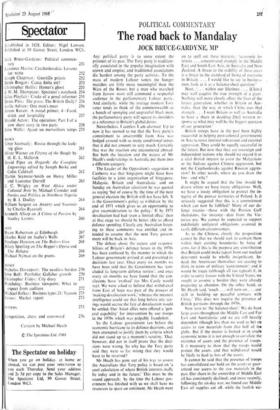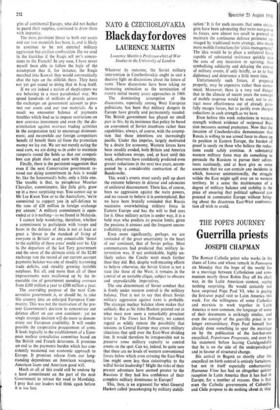The road back to Mandalay
POLITICAL COMMENTARY JOCK BRUCE-GARDYNE, MP
Any political party is to some extent the prisoner of its past. The Tory party is tradition- ally associated in the popular imagination with crown and empire; and traditional associations die hardest among the party activists. To the mass of modern Labour voters the hunger marches are little more meaningful than the Wars of the Roses; but a man who marched from Jarrow must still command a respectful audience in the parliamentary Labour party. And similarly, while the average modern Tory voter tends to think of the commonwealth as a bunch of sponging and ungrateful black men, the parliamentary party will square its shoulders at a reference to Britain's global duties.
Nevertheless, I confess 1 am alarmed. Up to now it has seemed to me that the Tory party's commitment to unscramble from Asia was hedged around with so many conditional tenses that it did not amount to very much. Certainly that was the reaction one encountered abroad. But both the location and the nature of Mr Heath's undertakings in Australia put them into a different category.
The Leader of the Opposition's suggestion in Canberra was that Singapore might lease base facilities to a joint organisation of Singapore, Malaysia, Britain and Australasia; and on Sunday on Australian television he was quoted as saying 'but of course by the time of the next general election the British will not have left. It is the Government's policy to withdraw by the end of 1971 which gives us an opportunity to give reconsideration to the policy.' If by 1971 devaluation had had 'even a limited effect' then at that stage we should be better able to afford defence spending. Clearly any Australian listen- ing to these comments was entitled and in- tended to assume that the next Tory govern- ment will be back in Asia.
The debate about the nature and responsi- bilities of Britain's defence forces in the 1970s has been confused by the manner in which the Labour government arrived at and presented its decisions last year. Once every six months we have been told that the Government has 'con- cluded its long-term defence review'; and once every six months we have found that the con- clusions have 'evolved' (as Mrs Castle would say). We were asked to believe that withdrawal from East of Suez was part of the process of `making devaluation work,' whereas the meanest intelligence could see that long before any sav- ings would accrue the fate of devaluation would be settled. Our Asian allies were offered a 'gen- eral capability' for intervention by our troops in the 1970s which was palpably fraudulent.
So the Labour government ran before the economic hurricane to its defence decisions. and then attempted to justify them by criteria which did not stand up to a moment's scrutiny. That. however, did not in itself prove that the deci- sions were wrong. So why has the Tory party said they were so far wrong that they would have to be reversed?
Mr Heath has gone out of his way to assure the Australians that Tory policy is based on 'a cool calculation of where British interests really lie today and in the future.' This must be the sound approach: by the time the Labour gov- ernment has finished with us we shall have no resources to spare on sentiment. Mr Heath went on to spell out these interests: 'economic in- terests . .. concentrated strongly in the Middle East and South-East Asia, in Australia and New Zealand. A threat to the stability of these areas is a threat to the standard of living of everyone in Britain. . . . I would like to say to business- men, look at it as a balance-sheet question.'
Next, `. . . within our lifetimes . . . [China] may well acquire the true strength of a giant. Nothing will more closely affect the lives of the future generation, whether in Britain or Aus- tralia, than the way in which China uses that strength.... I want Britain as well as Australia to have a share in deciding Ethel western re- sponse to what may well be the biggest question of our generation.'
British troops have in the past been highly successful in helping post-colonial governments in Asia to resist internal subversion and external aggression. They could be equally successful in the future. But now that they are sovereign and independent nations why should we regard it as a vital British interest to assist the Malaysians or the Indians against Chinese aggression, but not the Czechoslovaks against Russian aggres- sion? In other words, where do you draw the line--and why?
It might be argued that the line should be drawn where we have treaty obligations. Well, we have a treaty obligation to protect the in- tegrity of the prewar territories of Poland. Is it seriously suggested that this is a commitment which can now be fulfilled? Many of our de- fence treaties—those with the Persian Gulf sheikdoms, for instance—date from the Vic- torian era. We cannot be expected to support indefinitely unilateral obligations assumed in vastly different circumstances.
As to the Chinese, clearly the proposition cannot be that we should seek to contain them within their existing boundaries by force of arms, for if this is the purpose any contribution that Britain could make (apart from our nuclear deterrent) would be wholly insignificant. In- deed. the Americans themselves are ceasing to think in terms of military 'containment'; and it would be tragic (although all too typical) if, in order to curry favour with the United States, we sought to assume a burden they were already preparing to abandon. On the other hand, as Mr Heath said, 'much . .. will turn on ... our skill in building up peaceful contacts with China.' This does not require the presence of British garrisons through the 1970s.
Now turn to 'the balance-sheet.' We do have large assets throughout the Middle East and Far East and Australasia; and we are still heavily dependent (though less than we used to be) on access to raw materials from that half of the globe. But if the matter is looked at in crude economic terms it is not enough to correlate the existence of assets and the presence of troops. It is necessary to show that the troops would protect the assets, and that withdrawal would be likely to lead to loss of the assets.
It cannot be said that the presence of troops has consolidated our hold on the assets or guar- anteed our access to the raw materials in the past. Our share in the ownership of Middle East oil has consistently declined; and more recently, following the six-day war, we found our Middle East oil supplies cut off, while the foolish vir-
gins of continental Europe, who did not bother to guard their supplies, continued to draw them with impunity.
The most persistent threat to both our assets and our raw materials has been, is, and is likely to continue to be not external military aggression but civilian confiscation. Do we send in the Gurkhas if the Iraqis sell IPC'S conces- sions to the French? In any case, I have never myself been able to follow the logic of the assumption that if, for instance, the Iraqis marched into Kuwait they would automatically shut the taps on the oilfields there. They have not yet got round to doing that in Iraq itself.
If we are indeed a nation of shopkeepers we are behaving in a most paradoxical way. We spend hundreds of millions of pounds across the exchanges on government account to pro- tect our assets and our raw materials. As a result we encounter balance of payments troubles which lead us to impose restrictions on new overseas investment and even (by the dis- crimination against overseas trading activities in the corporation tax) to encourage disinvest- ment; and meanwhile our foreign competitors benefit (if benefit there is) from the protection money we lay out. We are not merely eating the seed corn, we are doing so in order to maintain ramparts round the fields so that our competi- tors can plant their seed corn with impunity.
Finally, there is the persistent suggestion that even if the next Conservative government re- vived our dying commitment in Asia it would be, like the housemaid's baby, only a little one. The trouble is that, to paraphrase Maurice Chevalier, commitments, like little girls, grow up in a most surprising way. You cannot say to Mr Lee Kwan Yew or to the Australians, 'we're committed to support you in self-defence to the tune of £20 million in foreign exchange per annum.' A military commitment is open- ended or it is nothing—as we found in Malaysia.
I cannot help wondering, therefore, whether a commitment to participate with troops and bases in the defence of Asia is not at least as great a 'threat to the standard of living of everyone in Britain' as any conceivable 'threat to the stability of these areas' could ever be. Up to the departure of the last Tory government and the onset of the ultimate crisis of the $2.80 exchange rate the record of our current account payments balance was one of steadily narrowing trade deficits, and steadily growing invisible surpluses. Yet all, and more than all of these improvements were swallowed up by the in- exorable rise of government spending overseas from £100 million a year to £500 million a year.
The overriding purpose of the next Con- servative government is, or should be, to take this country into an enlarged European Com- munity. This was not the motivation of the pre- sent Government's decision to concentrate our defence effort on our own continent: yet no single strategic decision will do more to demon- strate our European credibility. It will render possible the cooperative procurement of arms. It leads logically to the establishment of a Euro- pean nuclear consultative committee based on the British and French deterrents. It promises an end to the payments burden which has con- sistently weakened our economic approach to Europe. It promises release from our long- standing dependence on American weaponry, American loans and American good will.
Much or all of this could still be undone by a hard commitment on the part of the next Government to retrace the road to Mandalay. I pray that our leaders will think again before it is too late.



































 Previous page
Previous page